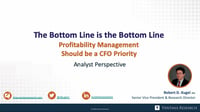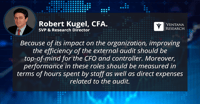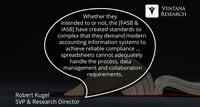The Chief Financial Officer can enable her or his finance department play a more strategic role in company operations by adopting what I call profitability management. In the interest of time I’ve made this a very high-level description that’s intended to be just an introduction to the topic. Profitability management is a cross-functional effort. It integrates finance and sales to achieve an optimal balance of revenue and margin objectives. It’s an analytics-based approach designed achieve...
Read More
Topics:
Office of Finance,
Continuous Planning,
CFO,
Financial Performance Management (FPM),
CEO,
Integrated Business Planning
For decades I’ve heard people talk about cutting audit costs to reduce administrative overhead but based on my observations, I was skeptical — mostly because, until recently, the documented success stories haven’t been about going from good to great so much as going from awful to average. That’s changing. I recently wrote about a company that had set out to cut its external auditor’s fees. The benefits it had accrued are significant, including a reduction in staff time devoted to the audit. I...
Read More
Topics:
Office of Finance,
audit,
Continuous Accounting,
financial performance,
CFO
I recently attended BlackLine’s annual user conference. The company aims to automate time-consuming repetitive tasks and substantially reduce the amount of detail that individuals must handle in the department. The phrase “the devil is in the details” certainly applies to accounting, especially managing the details in the close-to-report phase of the accounting cycle, which is where BlackLine plays its role. This phase spans from all the pre-close activities to the publication of the financial...
Read More
Topics:
automation,
close,
closing,
Consolidation,
control,
effectiveness,
Reconciliation,
CFO,
compliance,
Data,
controller,
Financial Performance Management,
FPM,
Sarbanes Oxley,
Accounting,
reconcile
Accountants love electronic spreadsheets – and for good reason. They’re a powerful and versatile personal productivity tool and just about everyone knows how to use them. Spreadsheets are the default software tool for accountants because they enable autonomy (you don’t need to ask IT for anything) and they’re free (so you don’t have to make a business case to authorize buying something). Some accountants humorously (but earnestly) invoke the line “you’ll have to pry this spreadsheet from my...
Read More
Topics:
ERP,
Office of Finance,
Continuous Accounting,
Controller,
FASB,
IASB,
CFO,
Financial Performance Management,
Spreadsheets,
Enterprise Resource Planning,
ERP and Continuous Accounting,
revenue recognition,
Accounting,
Lease Accounting,
real estate,
Lease Management,
ASC842,
IFRS16,
leasing
For several years, I’ve commented on a range of emerging technologies that will have a profound impact on white-collar work in the coming decade. I’ve now coined the term “Robotic finance” to describe this emerging focus, which includes four key areas of technology: Artificial intelligence (AI) and machine learning (ML), robotic process automation (RPA), bots utilizing natural language processing, and blockchain distributed ledger technology (DLT), each of which I describe below. Robotic...
Read More
Topics:
ERP,
Machine Learning,
close,
Consolidation,
Continuous Accounting,
Reconciliation,
CFO,
Robotic Process Automation,
blockchain,
AI,
natural language processing,
Accounting
In 2013, the Organization for Economic Cooperation and Development (OECD) published a report titled “Action Plan on Base Erosion and Profit Shifting” (commonly referred to as “BEPS”), which describes the challenges national governments face in enforcing taxation in an increasingly global environment with a growing share of digital commerce. Country-by-country (CbC) Reporting has developed in response to the concerns raised in the report. To date, 65 countries (including all members of the...
Read More
Topics:
ERP,
GRC,
audit,
finance transformation,
LongView,
Tax,
Business Analytics,
Oracle,
CFO,
Vertex,
FPM,
legal,
tax optimization,
tax data warehouse Thomson-Reuters multinational,
international tax,
tax compliance
The application of artificial intelligence (AI) and machine learning (ML) to business computing will have a profound impact on white collar professions. This is especially true in heavily rules-based functions such as accounting. Companies recognize the transformational potential of AI and ML, but the progression and pace of the adoption of these technologies is unclear. Some applications of AI and ML are already in use but others are a decade or more away from replacing human tasks.
Read More
Topics:
Big Data,
Machine Learning,
Office of Finance,
Analytics,
CFO,
finance,
CEO,
AI,
AICPA,
natural language processing,
Accounting
Fra Luca Pacioli, a 15th-century Franciscan friar living in what’s now Italy, is credited with codifying double-entry bookkeeping, which is the foundation of accounting. Pacioli, a polymath, was well acquainted with his contemporary and fellow polymath Leonardo Da Vinci. So, given they were at times collaborators, it’s fitting that one of the most important applications of SAP’s Leonardo technology will be in helping to disrupt finance and accounting organizations in corporations.
Read More
Topics:
ERP,
Machine Learning,
Office of Finance,
Internet of Things,
CFO,
Artificial intelligence,
blockchain,
AI
Workiva’s Wdesk, a cloud-based productivity application for handling composite documents, will have a larger role to play as companies adopt new revenue recognition standards governing accounting for contracts. The Financial Accounting Standards Board (FASB), which administers Generally Accepted Accounting Principles in the U.S. (US-GAAP), has issued ASC 606 and the International Accounting Standards Board (IASB), which administers International Financial Reporting Standards (IFRS) used in most...
Read More
Topics:
close,
closing,
XBRL,
CFO,
Document Management,
SEC,
Composite document,
10K
The treasury function in finance departments doesn’t get a lot of attention, but it’s a fundamentally important one: to ensure that all funds are accounted for and that there is sufficient cash on hand each day to meet operating requirements. Keeping track of and managing cash, especially in larger organizations, can be complicated because of multiple bank accounts, complex financing requirements and various methods of receiving and making payments; the complexity deepens when more than one...
Read More
Topics:
Predictive Analytics,
Office of Finance,
credit,
debt,
Analytics,
CFO,
cash management,
controller,
Financial Performance Management



















